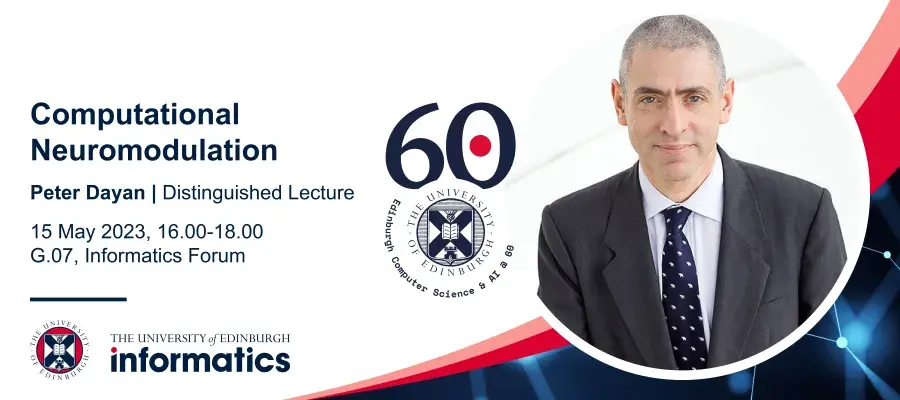Interview with Peter Dayan
As part of the 60 years of computer science and AI celebration, distinguished researchers from both disciplines have been invited to visit the School of Informatics. We have asked them to tell us about their research. Peter Dayan FRS is a neuroscientist and computer scientist who is the director at the Max Planck Institute for Biological Cybernetics in Tübingen in Germany.
Title: Computational Neuromodulation
Lecture abstract
Neural processing faces three rather different, and perniciously tied, communication problems. First, computation is radically distributed, yet point-to-point interconnections are limited. Second, the bulk of these connections are semantically uniform, lacking differentiation at their targets that could tagparticular sorts of information. Third, the brain's structure is relatively fixed, and yet different sorts of input, forms of processing, and rules fordetermining the output are appropriate under different, and possibly rapidly changing, conditions. Neuromodulators such as dopamine, serotonin,norepinephrine and acetylcholine address these problems by their multifarious and broad distribution, by enjoying specialized receptor types inpartially specific anatomical arrangements, and by their ability to mold the activity and sensitivity of neurons and the strength and plasticity of theirsynapses. They are also intimately linked to psychiatric disorders, or at least attempts to treat these disorders. I will discuss a long arc of successful andfailed attempts to provide computational accounts of these critical transmitters in decision-theoretic terms.
Speaker's bio
Peter Dayan studied mathematics at Cambridge University and received his doctorate from the University of Edinburgh. After postdoctoral research at the Salk Institute and the University of Toronto he moved to the Massachusetts Institute of Technology (MIT) in Boston as assistant professor in 1995. In 1998, he moved to London to help co-found the Gatsby Computational Neuroscience Unit, which became one of the best-known institutions for research in theoretical neuroscience, and was its Director from 2002 to 2017. He was also Deputy Director of the Max Planck/UCL Center for Computational Psychiatry and Ageing Research. In 2018, he moved to Tübingen to become a Director of the Max Planck Institute for biological cybernetics. Peter Dayan’s research focuses on decision-making processes in the brain, the role of neuromodulators as well as neuronal malfunctions in psychiatric diseases. Dayan has long worked at the interface between natural and engineered systems for learning and choice and is also regarded as a pioneer in the field of Artificial Intelligence.
In 2012, Peter Dayan received the Rumelhart Prize for Contributions to the Theoretical Foundations of Human Cognition and, in 2017, the Brain Prize from the Grete Lundbeck European Brain Research Foundation. In 2018, he was elected as a Fellow of the Royal Society of the United Kingdom. In 2019, he became Fellow of the American Association for the Advancement of Science (AAAS).
Peter Dayan was also awarded an Alexander von Humboldt Professorship, Germany's most highly endowed research prize and for which he will join the Department of Computer Science at the University of Tübingen.


